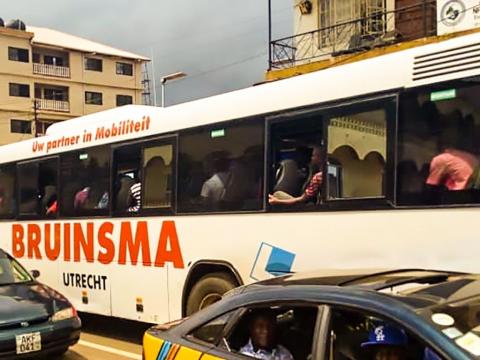By Mabinty M. Kamara
Residents across Freetown are calling on the Sierra Leone government to review the 10-hour curfew imposed as part of measures to curtail the spread of COVID-19, which they say has had a counterproductive effect on their livelihoods.
The 9pm to 7am curfew was declared in April, after the country recorded its index case of the disease.
The decision particularly impacted businesspeople, many of whom say they were already struggling to cope with declining sales due to the direct effect of the pandemic before the movement restrictions.
Aminata Bangura, a trader at Malama Thomas Street in Freetown, said difficulty in accessing public transportation worsened an already difficult situation before the curfew.
“There are not enough public transportation and the traffic also is not helping. Imagine all these people need to be transported to their various destinations, but by the time a vehicle moves from East End Police to Calaba Town and back, it’s already past 8:00 O’clock and they (drivers) too are worried about being caught for violating the curfew,” Bangura explained as she hurriedly packed her wares ahead of the looming deadline.
She said many commercial transport drivers have resorted to taking passengers going to shorter route, leaving behind those traveling longer distances.
The conspicuous absence of government operated buses on the roads appears to have worsened the situation for the ordinary Sierra Leoneans. And this, Ibrahim Shaw, a trader along Garrison Street, finds difficult to understand.
“At least that would have helped reduce the transportation challenge,” he said.
Mr Shaw also wonders about the link between the spread of covid-19 and restriction of movement of the people at night.
Journalists are another set of people severely affected by the curfew. They say they can no longer pursue potential late breaking news and some are forced to rush or abandon stories on important issues that run late into the day, due to lack of time to properly work on them.
"Before now we used to be in the office till around 12am, working on certain breaking news stories, but now you find out that we are working under extreme pressure,” lamented Alusine Sesay, Editor of Concord Times Newspaper.
And the rush to beat the curfew deadline clearly proves counterproductive to the goal of the measures introduced by the National Covid-19 Emergency Operation Center (NACOVERC).
Due to the limited public transportation services, passengers are left at the mercy of the ever exploitative commercial transport drivers. For instance, even though the NACOVERC measures prohibits overloading, overloaded buses, Poda Podas and taxis are a common sight on the highways.
Bus driver, Alfred Blango, defended this, arguing that it’s all in the interest of the passengers.
“Which vehicle do you think can take all these people to their various destinations in time? It is better that we are trying to take some because the police do not want to know what kept you on the street till 9:00. All they care about is to mount the check point when it’s time," he said.
A female passenger in Blango's bus argued that that the restrictions were only meant to inconvenience the poor.
"Look at the way we fight to go into vehicles and look at the way we are clustered here. If it's for the corona, then I think this is unnecessary,” the passenger, named Rugi, said.
She believes that the continued spiraling of Covid-19 cases in Freetown must have something to do with the chaotic scenes in the public transportation system.
“Nobody wants to sleep on the street or in police custody and as it is now you can't expect us to close business by 4 o’clock when we don’t get to reach our business places until 9am or even later, because of the same curfew," Rugi added.
Police Media and Public Relations Officer, Superintendent Brima Kamara, told Politico that compliance to the curfew in the Western Area has so far been appreciable, linking it to recent intervention by the police.
In strategic points of the city, the police have mounted loud speakers through which they remind the public as the deadline for the curfew approaches.
“We are there to enforce the law,” Supt Kamara said, adding: “A lot of people used to sleep in their vehicles or in stations when the time was up. But now that has been minimized,” he said.
The police spokesman said there was this set of people who, no matter, would violate the law.
Mohamed Amadu Bah, President of the Sierra Leone Motor Drivers and General Transport Workers Union, said while the curfew was a good measure, because of the way it’s being implemented it has negatively impacted both the driver’s and the passengers.
“The people are suffering because of the limited vehicles. And we have told our men to avoid overloading and as a result of that, most of them said they can’t make profit. So we told them they can pack if they want because government has done same by packing its own vehicles, instead of overloading people. So this is why people are suffering,” Bah said.
Efforts to reach the Ministry of Transport and Aviation to comment on the concerns raised with regards the lack of public transports proved futile.
Copyright © 2020 Politico Online








